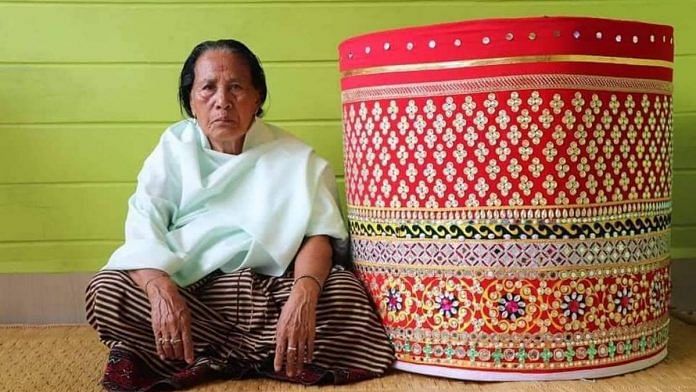
New Delhi: Hanjabam Ongbi Radhe Devi could hardly believe her ears when she was recently told that she would be conferred with the Padma Shri, the country’s fourth highest civilian award, this year.
The award is a recognition of 88-year-old Devi’s contribution towards conserving the art of making ‘potloi’ (a traditional bridal costume of the Meitei community in Manipur) and also as a ‘potloi setpi’ (bridal dresser). The list of awardees was announced on Republic Day.
“I was shocked and lost for a moment when my granddaughter informed me the news. I asked myself how am I conferred with the award? I had to sprinkle water in my head, wash my face and then I got back to my normal state again,” Radhe told the Imphal Free Press.
Devi, who hails from Wangjing in Thoubal district of Manipur, was taught the art of making potloi by a woman named Longjam Ongbi Priyasakhi when she was in her 20s. Devi ran a tea stall at the time but was struggling to make ends meet. It was Priyasakhi who then asked Devi to join her as an apprentice for potloi dressings to help her earn some extra money.
Naga entrepreneur turns surplus dragon fruit into wine
Lucy Ngullie, an entrepreneur from Nagaland, has successfully produced a 100 per cent organic dragon fruit wine. The two-year-old wine is available in red and white varieties, and will be up for sale starting February. A bottle is expected to cost Rs 1,100.
“Dragon fruits are seasonal and perishable fruits. So I thought if I can convert some of the abundant harvests into wine or juice, then the fruits won’t go to waste,” Ngullie was quoted as saying.
The wine was formally launched last week by Dimapur district Public Relations Officer Lolano Patton at Ngullie’s farm, located at Shitovi village. Ngullie was tutored on dragon fruit wine-making by a Philippino winemaker. The ingredients used were all imported from Canada.
2 new species of wasps sighted for the first time in Assam
Two new species of Vespidae (a family of wasps) — one a Potters wasp and the other a Hornet — have been sighted in Assam for the first time. The specimens were collected by Bikramaditya Bakaliyal, an assistant professor in the state’s Bahona College, and sent for verification and confirmation to the Zoological Survey of India (ZSI).
In an email to Bakaliyal, P. Girish Kumar, scientist at ZSI, has stated that these wasps were new records for Assam.
Bakaliyal was quoted as saying that he has been engaged in the research of wasps, bees’ hornets and other insects, like ants and butterflies, for the past couple of years. He also said that he would often catch them during leisure hours for study purposes.
Bakaliyal said the two new wasps have been sighted in some parts of Meghalaya, Nagaland, Arunachal Pradesh and in Uttar Pradesh. But there had been no records of sightings in Assam before this.
Naga festival to preserve tribal culture kicks off with sacred fire, traditional wine
Gaan Ngai, one of the biggest and longest festivals of the Zeliangrong community, an indigenous Naga tribe, began earlier this week with the igniting of a sacred fire using a piece of bamboo and dry wood, and serving wine to the ‘supreme god’.
The theme of this year’s festival, which began on 26 January in Manipur’s Imphal West district, was ‘Loss of religion is loss of culture, loss of culture is loss of identity’.
According to custom, the inaugural fire is ignited by young men and the traditional wine is served to the supreme god by an elder of the community.
“Gaan-Ngai is the customary festival of extracting sacred fire (Mai labmei) not a harvesting festival. The sacred fire is distributed to every household … with a belief that the sacred fire will ward off evil spirits and bring good health and prosperity to the community,” Kabui Union Manipur President K. Heera Kabui said.
Subscribe to our channels on YouTube & Telegram
Why news media is in crisis & How you can fix it
India needs free, fair, non-hyphenated and questioning journalism even more as it faces multiple crises.
But the news media is in a crisis of its own. There have been brutal layoffs and pay-cuts. The best of journalism is shrinking, yielding to crude prime-time spectacle.
ThePrint has the finest young reporters, columnists and editors working for it. Sustaining journalism of this quality needs smart and thinking people like you to pay for it. Whether you live in India or overseas, you can do it here.